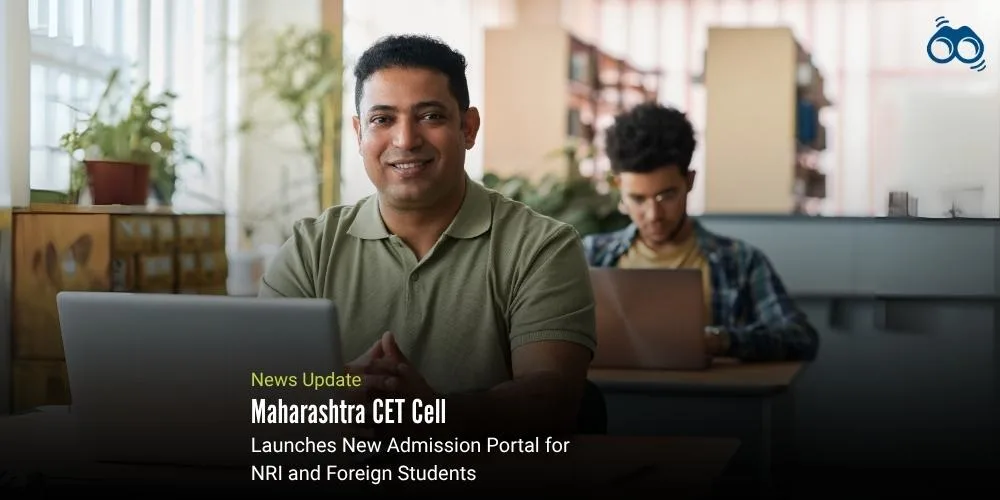State CET Cell Introduces Centralised System for Foreign and NRI Quota Admissions
State CET Cell Introduces Centralised System for Foreign and NRI Quota Admissions
In a strategic move to streamline access to higher education for globally dispersed applicants, the Maharashtra State Common Entrance Test (CET) Cell has taken a significant step towards internationalisation. On 25 July, the CET Cell reportedly launched a dedicated online portal to facilitate admissions for international category students for the 2025–26 academic year. This portal is specifically designed to accommodate a diverse group of applicants, including Non-Resident Indians (NRIs), Overseas Citizens of India (OCIs), Persons of Indian Origin (PIOs), Children of Indian Workers in Gulf Countries (CIWGC), and Foreign Nationals (FNS). By centralising the application process, the initiative aims to enhance transparency, accessibility, and operational efficiency for students residing outside India.
Following an amendment to the definition of NRIs on 25 June, the authorities have revised the eligibility criteria and documentation requirements for NRI quota admissions. Under the new provisions, NRIs are defined as individuals classified as ‘not ordinarily resident’ under the Income Tax Act, as well as those holding an NRI certificate issued by an Indian Mission abroad. Their children or dependents are also included within this category.
To facilitate the revised process, the Maharashtra CET Cell has launched a new admission portal—https://fn.mahacet.org for international category students seeking admission to technical, medical, higher education, and fine arts programmes across the state. All recognised universities, colleges, and institutions offering NRI and supernumerary quota seats have been directed to adhere to the updated procedure. Each institution will receive unique login credentials to access applications, verify eligibility, and publish merit-based admission lists.
Admissions will be confirmed only upon payment of the prescribed fee in USD, completion of in-person document verification, and final confirmation through the portal. While candidates may receive multiple offers, they will be permitted to confirm only one seat; failure to remit payment within the stipulated timeframe will result in cancellation of the allotted seat. To support visa applications, the CET Cell will issue provisional eligibility certificates (PECs); however, final admission will be contingent upon document verification by the respective institution. Furthermore, colleges are required to assist admitted international students in completing immigration formalities within 14 days of joining. Institutions must also ensure that essential documents, including medical reports, proof of residence, and accommodation details, are uploaded to the portal.
Jayant Patil, Officer on Special Duty at the CET Cell, stated that a dedicated registration portal has been launched for 'Foreign National' candidates. From this academic year onwards, students born outside India with parents residing abroad will be classified under the NRI category, with both conditions now mandatory under the revised definition. He further noted that, in previous years, certain candidates had gained admission by falsely listing overseas relatives as dependents, a practice that is now strictly prohibited. As part of the registration process, candidates are required to pay a non-refundable fee of $50. Upon receiving an admission offer, they must confirm their seat by paying an additional $1,150. Patil emphasised that in earlier years, some low-scoring CET candidates had secured admission to prestigious institutions such as COEP under the 'Foreign National' category. He affirmed that such misuse will now be fully curtailed under the revised regulations. This initiative marks a decisive step towards ensuring integrity, fairness, and global inclusivity in Maharashtra’s higher education admissions.
Editor’s Note:
The launch of the Maharashtra CET Cell’s new portal for international admissions marks an important step toward making the state’s higher education system more globally accessible. In today’s connected world, it has become necessary to create a clear and fair process for admitting students from categories such as Non-Resident Indians (NRIs), Overseas Citizens of India (OCIs), Persons of Indian Origin (PIOs), Children of Indian Workers in Gulf Countries (CIWGC), and Foreign Nationals (FNS). The new rules, which require that students be born outside India and have parents living abroad, help make the NRI category more transparent and prevent misuse of reserved seats. Other changes, such as issuing provisional eligibility certificates (PECs), verifying documents in person, and paying fees through a central portal, make the process more secure and organised. Colleges are also expected to help international students with immigration steps and upload all required documents, making sure students are supported after joining.
Skoobuzz asserts that altogether, these efforts show that Maharashtra is serious about protecting fairness, improving the admissions process, and welcoming students from around the world.














0 Comments (Please Login To Continue)